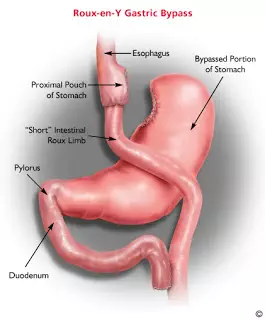Not a RNY patient? Check out:
- What vitamins should VSG patients take?
- What vitamins should Adjustable Gastric Band (Lap-Band) patients take?
- What vitamins should Duodenal Switch patients take?
The vitamins you need may vary based on your individual needs and the results of your blood tests, but here’s what the American Societyfor Metabolic and Bariatric Surgery (ASMBS) recommendations say you should start with:
- An adult multivitamin, containing 100% of the recommended daily allowance (RDA) of at least 2/3 of all nutrients, including 18 mg iron and minerals like zinc and selenium, twice daily
- 1500 mg to 2000 mg calcium citrate (not calcium carbonate or tricalcium phosphate), divided into three or four doses of about 500 mg each, taken at least two hours apart
- An additional 18 mg to 27 mg iron for menstruating women
- 350 mcg to 500 mcg sublingual B12 daily OR 1000 mcg B12 injections once a month
- B-50 complex is optional
Notice that the ASMBS recommends an adult multivitamin. While some surgeons and dieticians recommend children’s chewable vitamins to patients, these are usually missing some key nutrients that gastric bypass patients need. Read the label of any multivitamin you are considering carefully and make sure it has 100% of the RDA of most ingredients and that it has minerals like copper, zinc, and selenium. Special bariatric formulas are available, but you can use a non-bariatric multi, too, as long as it meets the ASMBS guidelines.
Choose a calcium supplement that contains calcium citrate, not calcium carbonate, tricalcium phosphate, or a combination of different types of calcium. RNY patients don’t have enough stomach acid to break down calcium carbonate or tricalcium phosphate for absorption. That means supplements like Viactiv, Tums, Caltrate, and Citracal gummies aren’t good choices.
It’s important to note that both men and women need iron after RNY, including postmenopausal women. Some types of iron, like ferrous sulfate, often cause constipation and an upset stomach, but other forms, like carbonyl iron, are usually gentler on the stomach and are less likely to cause constipation. Calcium interferes with the absorption of iron, so take your iron supplement at least two hours before or after your calcium supplements and any dairy products.
Bariatric surgeons often recommend using chewable or liquid vitamins for the first few weeks or months after surgery. You can switch to vitamins that you swallow as soon as you are able to tolerate swallowing pills, according to the ASMBS. If you like chewable vitamins better, though, you can stick with those as long as you like.
If you have questions about the vitamins you need, talk to your bariatric surgeon or a registered dietician with bariatric experience (make sure you see a registered dietician, because they have college degrees in nutrition and have to pass a licensing exam, while nutritionists don’t have to have a college degree or pass any kind of exam). You’re also welcome to contact Nik at nikki@bariatricfoodie.com. While we can try to point you in the right direction, though, we cannot give medical advice! If you need advice on your specific situation, again, your best bet is to contact your medical team.
Now go…take your vitamins!
This article was written by Kelly Morris for Bariatric Foodie.
 Bariatric Foodie Play with your food
Bariatric Foodie Play with your food



Thanks for the first article that makes sense to me regarding what vitamins to take.
I would like to thank for penning this article. It is very useful. My father was diagnosed with chronic pain and vision problem after his bariatric surgery. He was advised to take bariatric multivitamins twice in a day. He is now better than previous.
Great information! Even at 5 years out I find these so helpful to me. It’s a reminder to me to double check what I have been taking and make sure it’s enough. Great job!
I am taking the Procare Bariatric Multivitamin chewable once a day Should I be taking a twice a day formula?